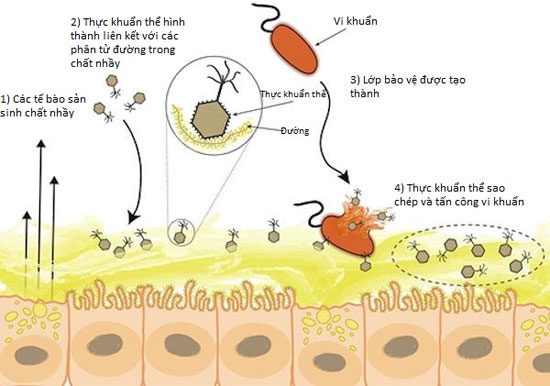Strange immune system on human and animal mucus
In our bodies, the main function of mucus is a protective layer that keeps the underlying tissues always wet and prevents outside bacteria and microorganisms from entering.
However, researchers at San Diago University (SDSU) have discovered that the surface of mucus is also an independent immune system , actively protecting our bodies from infectious organizations. infection in the environment.
Mucus is made up of lining tissues between the inner surfaces of organs such as the mouth, nose, sinuses, throat, lungs and stomach and intestines. The mucus layer has long been seen as a passive protective wall for the body against the risk of infection from the outside environment.

The bacterium is attacking a pathogenic bacterium.
When sampling mucus from animals and humans, the team at SDSU led by biochemist Jeremy Barr discovered the bacteriophages (also known as "bacteriophage" bacteria) on the surface of the class. gum. They put the phage on a mucus-forming layer and found that when exposed to the mucus surface, phage can automatically bind to sugar molecules that bind it to the surface.
Next, the team exposed the bacteria to E. coli bacteria. As a result, as soon as they realize the presence of E. coli, they can immediately attack and kill them in the mucus, forming an effective anti-bacterial barrier on the host's body, protecting the muscle. can avoid the risk of infection and germs.

To confirm their findings, the team also carried out a parallel experiment that gave two samples of cells - 1 with mucus containing phage and 1 without mucus. Both were challenged with E. coli and the result was that the cells without mucus had three times more dead cells than the rest.
According to Barr, what makes this finding surprising is that the bacterium has long been present on humans and animals. The human and animal bodies admit many types of phage bacteria from the environment. They automatically cling to the mucus layers on many parts of the body including the mouth and intestines. Phage can then become an "army" to protect the host, automatically accumulating and attacking strangers.

Dr. Jeremy Barr
"This finding not only shows a new immune system, but also demonstrates the first symbiotic relationship between phage and animal organisms. From here, it will have a significant impact on many areas," Barr said. .
- Close-up of the human body's immune system is beautiful
- Strange memory of slime mold
- The rats are prostrate and have a human immune system
- This super slim 'slimy' object is affordable
- Genetic contact between the immune system and the nervous system
- Foods that are harmful to the immune system
- After watching this video, you will see how amazing our immune system is
- The boy was born without an immune system
- The immune system becomes the same when we are together
- Microsoft uses AI to build a database of human immune systems
- Bacteria that wear 'invisibility cloak' escape the human immune system
- The girl is
 Green tea cleans teeth better than mouthwash?
Green tea cleans teeth better than mouthwash? Death kiss: This is why you should not let anyone kiss your baby's lips
Death kiss: This is why you should not let anyone kiss your baby's lips What is salmonellosis?
What is salmonellosis? Caution should be exercised when using aloe vera through eating and drinking
Caution should be exercised when using aloe vera through eating and drinking